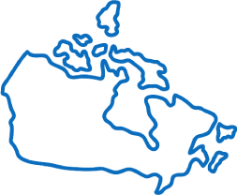Study in Canada



Capital Ottawa

Currency Canadian Dollar

Language English, French

Population 38.01 Million

GDP $ 1.71 Trillion

Dialling Code +1
Canada is one of the top international student destinations across the world. In the year 2019 more than 5.2 million students from all over the world decided to study in Canada. Canadian education stands unique is because of its strong focus on research and development.
Academic excellence, affordability, work opportunities during and post-study, pathway to permanent residence, and a safe living environment are just some of the reasons why Canada is ranked amongst the top destinations for students looking to study abroad.
In addition to all the above Canada offers Post-Graduation Work Permit Program (PWPP) that allows students to stay and work in Canada for 1 to 3 years after completion of the course.
Top 7 reasons for studying in Canada
Universities & Institutes in Canada follow an academic calendar that begins in September and ends in July.
There are three (3) intakes available in Canada:
Fall : The Fall intake starts in the month of September and this is the primary intake. Its also a popular intake for Indian students.
Winter : Starts in January, this intake is for students who missed their chance in Fall
Summer : This starts usually in April or May. This intake is only offered by few institutes for limited programs
Deadlines to apply for admission varies from institute to institute and Canadian admissions are a first-cum-first basis. Students must apply at least 6 months before the course start date
All Indian students who want to study in Canada and are enrolled in a course with 6 months of more duration will need to obtain a Canadian study permit, which serves as a Canadian student visa for the duration of your stay.
You must apply online at the Citizenship and Immigration Canada (CIC) website. There is a non-refundable fee of CDN 150/-
To apply you will need:
| You (Student) | Family member (spouse) | Every additional Family member |
| CAD $10,000/- | CAD $4000/- | CAD $3000/- |
Some students may also be required to appear for a personal interview at the Canadian embassy or consulate
Indian students applying to universities and colleges in Canada can now expect faster visa processing through the Study Direct Stream (SDS) program launched by the Immigration, Refugee and Citizenship Canada.
Canadian Study Permit holders who meet the eligibility criteria are allowed to work on or off campus without the need for a separate work permit. Students who meet the following criteria may work for up to 20 hours per week during term time, and full time during academic holidays:
Canada provides extensive work and career opportunities for students. Many institutions in Canada offer a co-operative education program. This is a structured program where students alternate between periods of work and study. This integrated curriculum is achieved through a partnership between the educational institution and industry.
The course fee at most Canadian universities or institutes is relatively affordable compared to many other countries. The expenditure on tuition fee depends on the type of qualification and institution you opt for.
| Study Level | Average Fee (Indicative) |
|---|---|
| Diploma / Advance Diplomas | CDN 14000 to CDN 20000 |
| Undergraduate | CDN 15000 to CDN 22000 |
| Masters | CDN 18000 to CDN 24000 |
| MBA | CDN 25000 to CDN 40000 |
| Doctoral & Phd | CDN 12000 to CDN 25000 |
Apart from the above Living Expenses in Canada are:
An average of CAD 10,000/- to CAD 12000/- per annum
You can apply for a Canada Study visa if you fulfill the following criteria:
Also at the time of the visa interview, you need to convince the visa officer that you will leave Canada once you complete your studies.
GIC or the Guaranteed Investment Certificate is scheme which is recommended for international students who wish to study in Canada in courses which come under the Student Direct Stream (SDS) policy. Under this students are required to deposit their one year’s living expenses into a Bank located in Canada in order to qualify for a student visa to study in Canada.
GIC accounts are basically savings accounts which offer fixed returns to all the eligible candidates over a period of time.
This is a compulsory requirement which all students need to fulfil if they plan on pursuing a course under the student direct stream.
The Canadian embassy has recommended a minimum of $10,000 CAD as the GIC amount for Canada student visa.
All candidates will need to begin the process of opening a GIC account at least a month before they apply for a Canada student visa. There are three major banks which allow students to open a Canada GIC account:
The general procedure followed by all the three banks is more or less, similar. Here is a basic outline of how students can get their proof of GIC amount for Canada student visa:
Registration Process
Actions to be taken by students on arriving in Canada:
Canada GIC Amount Refund Process
It is possible for students to get their GIC account amount refunded from their respective banks in the following circumstances.
The Canada GIC refund policy implemented by all the three banks is mostly similar. Candidates need to follow the below steps in order to get their GIC amount reimbursed.
As mentioned in the previous paragraphs, the basic process for opening a GIC account remains the same for all the three banks. So what sets them apart? Let’s take a look at the Canada GIC account process of different banks with respect to the document requirements, refund policies and processing fees.